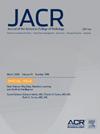Sustainability of Rideshare Programs to Promote Engagement of Underrepresented Populations in Breast Cancer Screening Trials
IF 5.1
3区 医学
Q1 RADIOLOGY, NUCLEAR MEDICINE & MEDICAL IMAGING
引用次数: 0
Abstract
Background
Transportation barriers significantly limit participation in breast cancer screening trials among Hispanic women, exacerbating disparities in breast cancer outcomes and underrepresentation in clinical research. Rideshare programs have emerged as a potential solution, but their long-term sustainability remains underexplored. Understanding sustainability capacity is critical to ensuring these programs can address structural barriers, promote health equity, and improve outcomes for underserved populations. The aim of this study is to evaluate sustainability capacity of a no-cost rideshare program and to identify potential strategies to support sustainability.
Methods
This explanatory, sequential, mixed-methods study evaluated the sustainability capacity of a no-cost rideshare program aimed at increasing Hispanic women’s participation in the Tomosynthesis Mammographic Imaging Screening Trial. Analyses and data integration were guided by the Capacity for Sustainability Framework. Average domain scores on the Program Sustainability Assessment Tool survey were calculated ranging from 1 to 7, with higher scores indicating higher levels for each domain, and structured interviews were analyzed using a rapid qualitative approach. Program Sustainability Assessment Tool and interview findings were integrated using a joint display.
Results
Survey responses (n = 37) indicated strengths in environmental support (mean score: 5.4) and partnerships (6.0), but challenges in funding stability (4.2) and strategic planning (4.5). Interview findings emphasized the importance of program champions and collaborative partnerships and highlighted gaps in securing diverse funding sources and engaging institutional leadership in strategic planning. Participants identified opportunities to strengthen communication, evaluate program impact, and adapt processes to meet evolving needs.
Discussion
Strong partnerships and champions supported the program’s initial success, but funding instability and insufficient strategic planning threaten sustainability. Future efforts should prioritize securing diverse funding, engaging leadership, and fostering collaboration to scale rideshare programs, thereby reducing disparities and advancing equity in breast cancer screening and research participation.
促进代表性不足的人群参与乳腺癌筛查试验的拼车项目的可持续性。
背景:交通障碍极大地限制了西班牙裔女性乳腺癌筛查试验的参与,加剧了乳腺癌结局的差异和临床研究中的代表性不足。拼车项目已成为一种潜在的解决方案,但其长期可持续性仍未得到充分探索。了解可持续性能力对于确保这些项目能够解决结构性障碍、促进卫生公平和改善服务不足人群的结果至关重要。本研究的目的是评估无成本拼车计划的可持续性能力,并确定支持可持续性的潜在策略。方法:本解释性、顺序性、混合方法研究评估了一项旨在增加西班牙裔妇女参与断层合成乳房x线摄影成像筛查试验(TMIST)的免费拼车计划的可持续性能力。分析和数据整合以可持续能力框架为指导。项目可持续性评估工具(PSAT)调查的平均领域得分从1到7不等,得分越高表明每个领域的水平越高,并使用快速定性方法分析结构化访谈。PSAT和访谈结果通过联合显示进行整合。结果:调查回复(N=37)表明在环境支持(平均得分:5.4)和伙伴关系(6.0)方面具有优势,但在资金稳定性(4.2)和战略规划(4.5)方面存在挑战。访谈结果强调了项目倡导者和合作伙伴关系的重要性,同时强调了在确保多样化资金来源和让机构领导参与战略规划方面的差距。参与者确定了加强沟通、评估项目影响和调整过程以满足不断变化的需求的机会。讨论:强有力的伙伴关系和支持者支持了项目的初步成功,但资金不稳定和战略规划不足威胁到可持续性。未来的工作应优先考虑确保多样化的资金,参与领导,促进合作,以扩大拼车项目,从而减少差距,促进乳腺癌筛查和研究参与的公平性。
本文章由计算机程序翻译,如有差异,请以英文原文为准。
求助全文
约1分钟内获得全文
求助全文
来源期刊

Journal of the American College of Radiology
RADIOLOGY, NUCLEAR MEDICINE & MEDICAL IMAGING-
CiteScore
6.30
自引率
8.90%
发文量
312
审稿时长
34 days
期刊介绍:
The official journal of the American College of Radiology, JACR informs its readers of timely, pertinent, and important topics affecting the practice of diagnostic radiologists, interventional radiologists, medical physicists, and radiation oncologists. In so doing, JACR improves their practices and helps optimize their role in the health care system. By providing a forum for informative, well-written articles on health policy, clinical practice, practice management, data science, and education, JACR engages readers in a dialogue that ultimately benefits patient care.
 求助内容:
求助内容: 应助结果提醒方式:
应助结果提醒方式:


